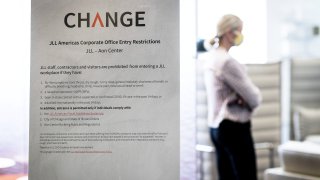
- Employees fully vaccinated against Covid should embrace a return to the office rather than run away from it, LaSalle Network CEO Tom Gimbel told CNBC on Wednesday.
- "They're viewing it as a punishment to come back into the office and they should be viewing it as a perk," the staffing firm founder said.
- Gimble believes bosses should mandate vaccinations in order to keep the majority of their workers safe from the coronavirus.
WATCH ANYTIME FOR FREE
>Stream NBC10 Boston news for free, 24/7, wherever you are. |
Employees fully vaccinated against Covid should embrace a return to the office rather than run away from it, LaSalle Network CEO Tom Gimbel told CNBC on Wednesday.
"The challenge that we have is a mindset challenge of the employee," said Gimbel, also founder of the Chicago-based national staffing and recruiting firm. "They're viewing it as a punishment to come back into the office and they should be viewing it as a perk to be back in the office, both for social and emotional issues as well as career growth and income growth."
Get updates on what's happening in Boston to your inbox. Sign up for our >News Headlines newsletter.
As many companies are putting their return-to-work plans together, some employees are pushing back against going back into the office after more than a year of remote work due to the pandemic.
"If we're going to be able to compete at a global level, or local level, we need to have our people together in the office, both for onboarding new employees and for camaraderie to make sure people stay around," Gimbel said on "Squawk Box," adding he believes bosses should mandate vaccinations in order to keep the majority of their workers safe from the coronavirus.
Gimbel's remarks follow Morgan Stanley's recent decision to bar workers and clients who are not vaccinated from returning to its New York City and Westchester County, New York, offices, beginning July 12. Employees who are not fully vaccinated will have to continue working remotely, the company told staff.
Money Report
Other financial giants are also taking that approach: Goldman Sachs is requiring its U.S. employees to report their vaccination status, and Blackstone is asking fully vaccinated U.S. employees to return to the office full time beginning July 7. While it's legal for companies to ask employees about their vaccination status, they must keep that information confidential.
With the economy bouncing back and the labor market tight, Gimbel said: "It is an employee market but that's going to change. And we're seeing that." He added, "Whether companies stay in business, go bankrupt, new ones emerge, there's going to be a time where whether people are paid a little bit more to go into the office or they choose to work someplace else."
Freedom of choice for employees is the best thing about the post-Covid shift, Gimbel said, adding that "if you don't like what your company's doing, you can leave and work for another company."
The nation's reopening efforts come against the backdrop of increasing concerns about the transmissible delta Covid variant, first identified in India. The delta strain now accounts for 20% of all new cases in the U.S., White House chief medical advisor Dr. Anthony Fauci said during a news conference Tuesday. That's up from 10% about two weeks ago.
With some companies moving to require full vaccination, Dr. Scott Gottlieb told "Squawk Box," in a later Wednesday interview, that it's "unclear" why health-care settings are still treating the Covid vaccines differently than other mandated inoculations.
"Health-care workers have to get a flu vaccine, a chickenpox vaccine, a hepatitis B vaccine, so it's unclear to me why health-care settings are treating this differently given that it does put patients at risk if a health-care worker transmits it inside a health-care setting. So I think that that's going to have to play out." Gottlieb said.
The former Food and Drug Administration chief said he believes that full FDA approval of Covid vaccines, which are currently cleared under emergency use authorization, won't tip the scale on non-health-care businesses mandating it. He said larger corporations may be more reluctant than smaller ones to mandate vaccines as part of a return to work.






